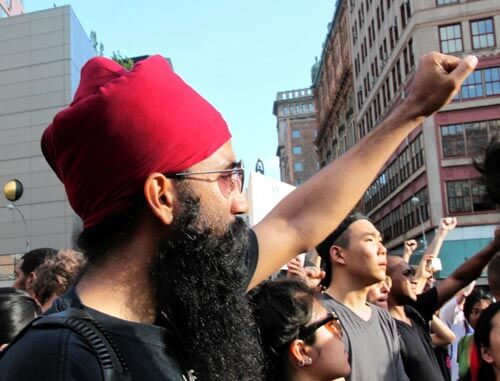Last month, Joanne Anderson made history in the city of Liverpool becoming England’s first Black female mayor.
A dedicated member of the Labour Party, she received 59.2 percent of the votes
Here in the United States, for almost half a century Americans have advanced minority representation casting majority votes for members of the gender and race.
Chicago natives elected one, voters in San Antonio, Texas, Atlanta, Georgia, Charlotte, North Carolina, New Orleans, Louisiana, and San Francisco, California also blazed the trail for Black women.
As a matter of fact of 307 American cities with a population of 100,000, 13 Black female mayors are now deciding policy for their residents.
New York City could increase that amount on June 22 when the Democratic primary selects the choice from a field of eight electable candidates — three women among them.
For the first time, from June 12 to that date voters will have an opportunity to test the ranking system enabling voters to check their preference for up to five choice candidates.
The candidate with the most votes will emerge the victor.
“It is important we rally and rank Maya Wiley number one,” Congresswoman Antonia Ocasio- Cortez said last weekend.
The Washington D.C. influencer endorsed Wiley, — the only female Black Democrat in the race — giving the former legal advisor to Mayor Bill de Blasio the kind of nudge that could influence the direction of progressive candidates.
The boost could prove to be a vital factor to determine whether or not history will be made with the election of the very first female first citizen of NYC – one of color.
Imagine Her honor seated at City Hall?
How about Madam Wiley calling the shots at Gracie Mansion?
A declared ‘progressive, change maker and mom,’ the candidate said: “I wont stand by while we risk losing a generation of our kids to the trauma of injustice and violence when we should be investing in their futures.”
“We have an option of a candidate who can center people, racial justice, economic justice and climate justice,” legislator AOC added.
She “didn’t just come up to run for mayor but has the experience and has a lifetime of dedication to this.”
Last week, attorney Wiley also garnered another power surge from Julian Castro, the expert President Barack Obama tagged to decide policies related to Housing and Urban Development.
“She’s laid out a bold progressive agenda to support working families and small businesses, improve housing affordability and public safety and ensure every New Yorker can prosper.”
Wiley’s approval rating has been inching up since debating her rivals during two television outings. On both occasions she seized on opportunities to question the credibility of her rivals.
Recently during a combative exchange with alleged frontrunner Brooklyn Borough President, Eric Adams, Wiley challenged the record of the former cop.
The former NAACP attorney, Civil Rights advocate, media pundit and commissioner of the Civilian Complaint Review Board wasted little time debunking the legacy Adams has boasted since joining the NYPD.
She cited corruption, collusion and his support of the disproportionate arrests of Black men under Stop & Frisk policing.
Wiley’s no-nonsense approach gives her the edge, Oklahoma’s Lelia Foley-Davis did not have when she was elected the first Black, female mayor in America.
Born and raised in a tiny town named Taft, the 30-year-old single mother of five children was collecting unemployment when she ran.
Reportedly she had lost her job as a teacher’s aide due to budget cuts.
Her biggest asset was a high school diploma and her will to lead.
Against all the odds, April 1973, Foley-Davis beat the incumbent by 93 votes.
Two months later, history repeated in Compton, California when Doris A. Davis emerged the first of her race and gender to win the mayoralty.
According to the Joint Center for Political Studies Foley-Davis did not even know her first place in American history until they informed her one year later.
That was almost 50 years ago.
“I have a plan called New Deal New York, which I can start executing on Day 1 because as mayor, I will have the power to increase our capital construction budget to $10 billion,” Wiley said.
“That just means money that helps us build things we need built and fixing things we need.”
Wiley is firm about transforming the NYPD.
She has also stated her case for improving health care, education and housing.
“We are building a movement by and for the people of New York City,” her campaign literature asserts.
According to a report from the Daily News, Wiley bolstered her campaign hiring Ifeoma Ike, her new senior advisor.
With only days to the primary, Ike, a former aide defected from campaigning for Diane Morales, Wiley’s rival.
The long list of supporters of a Black Her honor include: Congresspersons Hakeem Jeffries, Yvette Clarke, Jamaal Bowman, Katie Porter and Nydia Velasquez; former public advocate Mark Green, feminist Gloria Steinem and LGBTQ activist/actor Billy Porter.
“She will bring competence and compassion to City Hll and has the experience to bring people together to facilitate substantive change,” Clarke said.
“It’s time for a Black woman to be mayor and I am proud to support Maya.”
Three decades ago in 1989, New Yorkers made history when they elected David N. Dinkins, the first Black mayor of this city.
Catch You On The Inside!























